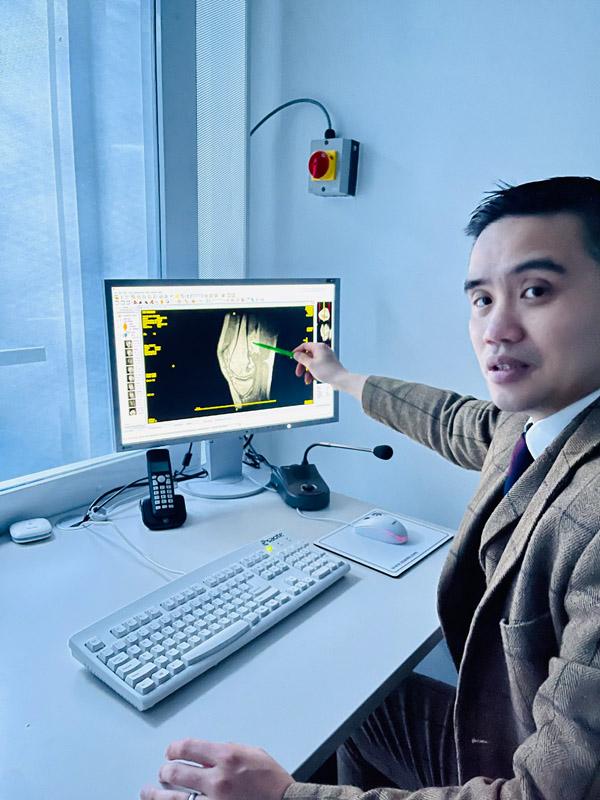Tired of one-size-fits-none solutions? Then don’t get one for your new knee – instead, find out how MSK Doctors (03300010048) can set you up with a fully customised to you, and how you move, TKR. All it takes is a little AI and personalisation.

If you're looking at how AI is being used to custom-plan new knee replacements, and you're worried about them trying to stick an AI inside of your new knee - I don't blame you.
That was my first worry too, but that's not at all what they're doing, because the truth is so much cooler. They're using AI to custom-design the new knee, and the surgical process, to make sure it's the most natural fit, no matter what your body shape is.
It is a little technical though - so if you would rather get all the details straight from an actual specialist (which I am not,) then I totally understand. I'll even set you up with the source for all my info, Prof. Paul Lee, the founder of MSK Doctors. All the details are at https://mskdoctors.com/treatments/twis-tkr
If you're still reading this, then I'm going to assume you want the layman's version - or as I like to consider it, the Everyman Edition. Here it is, short and sweet.
TKR, or Total Knee Arthroplasty, is nothing new - but what is new, is using some sweet new AI techniques to customise the entire process, to your anatomy.
Think of it like this, your knee is unique, and so is your leg, your hip, and everything else about you. Even if they're similar to other people, they're all bit different, leading to unique movement patterns, twisting, bending... you get the idea.
Unfortunately, all TKR surgeries are pretty much the same... or they were, before this new technique.
It uses advanced MRI techniques and MAI Motion Integration to collect incredible amounts of data about your knee, how you move, and how everything is connected inside. Then all that data is fed into an AI that simulates how it all works together for natural movement, and plans your surgery to get the best possible outcomes.
That's why it's called the "Turn With Intelligent Stability - Total Knee Replacement," or the TWIS-TKR technique. Instead of just putting in a knee that works for most people, most of the time, they focus on your personal, custom kinematic rotation alignment.
So what does that actually mean for you?
In clinical trials, this highly customised approach has been shown to accommodate a wide range of individual patient anatomy and kinematics, leading to more natural and responsive movement. That's because we're not all built quite the same,
Using this alignment technique, the MSK Doctors team can provide a total knee replacement that accounts for your body’s natural motion, providing a dynamically stable joint that can adapt to your changing movements.
There are three main areas where you can see major improvement, including enhanced mobility and range of motion, after your surgery. This advanced technique has also been shown to allow for more natural movement, based on your individual specific kinematics, which experts believe may help to speed up the recovery process.
It's hard to say just how much faster you'll recover, because, well.. it's personal, and depends on a million different factors, such as how well you follow your post-surgery routine.
Now we're getting to the important questions - and thankfully, they have simple answers.
It's great! Next.
No, I'm just kidding, let's talk about what they found in clinical trials, specifically, that patients with a knee installed using the TWIS-TKR method were able to return to their normal daily activities sooner, including walking and climbing stairs. More importantly, though, they also reported higher levels of satisfaction with their new knee, specifically mentioning that they felt less pain and discomfort after the surgery.
That's everything I want, personally - better function, easier mobility, and fast recovery with minimal pain.
Hang on though, because there's one thing that I haven't covered yet, and it's a big one.
Sign me up. Researchers believe that by evenly distributing loads and stress across the entire knee joint, the new TWIS-TKR technique may be able to reduce how often knee prosthetics wear out, leading to fewer surgeries and invasive procedures.
These are just the latest advancements, but you can be sure, there are more coming along as well.
As one knee expert explained, “The field of knee replacement is evolving rapidly, with innovations aimed at improving patient outcomes and enhancing the longevity of implants. As we look to the future, the integration of regenerative medicine, AI, and biotechnology promises even more personalised and effective treatments for those suffering from knee problems.”
My advice is simple, before you get a TKR, take the time to learn more about your options.
You may not want to get the old standard, when there's a new and improved technique available, that could make your recovery faster, your movement more natural, and your new knee more durable.
If nothing else, it's nice to talk to an expert, and get personalised advice, based on your real situation. It's certainly better than I can do through this blog.
If you want to know more, you can book an appointment at MSK Doctors, any time, with no referral or waiting list. Just visit them online at the link I dropped, or call their clinic at 03300010048.
You can also find details about what the future may hold for TKR techniques, in this new article about the latest, greatest, and upcoming innovations in the field, at https://mskdoctors.com/doctors/charlotte-barker/articles/innovations-in-knee-replacement-whats-new-and-whats-next
